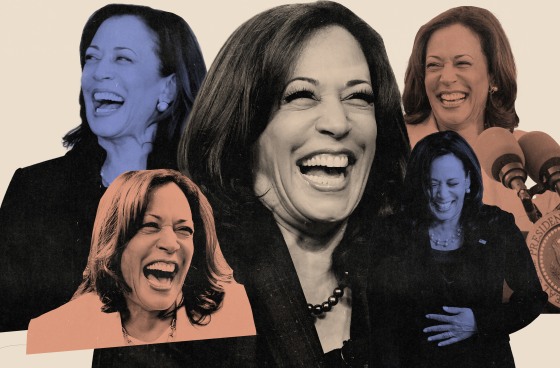Vice President Kamala Harris has been criticized for her race, gender, parental status — and most recently, her laugh.
With conservatives designating her laugh as “crazy,” “nuts” and a “cackle” in recent weeks, the language used to describe it is loaded and steeped in sexism, experts are saying.
During a campaign stop last week, former President Donald Trump mocked Harris’ laugh, calling her “laughing Kamala.”
“You can tell a lot by a laugh,” he said. “She’s crazy, she’s nuts.”
The National Republican Senatorial Committee released a memo last week highlighting what it saw as weaknesses in the Democratic camp. The last section read: “Weird” (a response to Harris’ campaign levying the same insult at Trump and Vance) with bullet points that included “Kamala Harris has a habit of laughing at inappropriate moments.”
Experts say this kind of focus on Harris is blatant misogyny — and labeling women in power as crazy is an age-old practice. It can be traced back to women being diagnosed with hysteria for laughing too much in the 19th century, which sociologists today say was an attack on female pleasure and enjoyment. More recently, Trump’s 2016 campaign ads included setting Hillary Clinton’s laugh to ominous background music.
And there’s an added racial layer, according to Oneka LaBennett, associate professor of gender and sexuality studies at the University of Southern California, who said that discomfort around Black and brown joy is disappointing but not surprising.
“She’s facing these intersectional forms of racism and misogyny,” LaBennett said. “The mocking of her laughter is a coded way of saying, ‘This woman has the audacity of being joyful in public. How dare she?’”
Accusations of being crazy or hysterical are nothing new in the political arena or in the lives of women more broadly, LaBennett said. For Black and brown women particularly, she said, displaying emotions in public can lead to tangible consequences such as noise complaints and harsher policing.
In politics, the same tropes are at play.
“When Black women like Michelle Obama express any kind of critiques of American society, they’re labeled as ‘angry Black women,’” she said. “When Harris expresses joy, she’s demonized and mocked for her laughter.”
The Trump campaign responded to NBC News’ questions about this by saying, “President Trump is a truth-teller, and there is nothing more unifying than telling the truth about a weak, failed, incompetent, and dangerously liberal Kamala Harris and her destructive policies,” said Steven Cheung, Trump campaign communications director.
Right-wing media personalities have worked Harris’ laugh into their discourse as well. Fox News host Sean Hannity recently dedicated a segment to explain why voters don’t like the vice president, and it was just filled with clips of her laughing.
“It’s sort of, you’re damned if you do, you’re damned if you don’t,” LaBennett said. “You can’t be too serious and you also can’t be joyful.”
On TikTok, her laugh has been in the background of viral sounds that have taken off in the weeks since she became the de facto nominee. Much of the discourse around those clips is positive.
In previous interviews, Harris said her strong “belly laughs” are something she holds dear.
“People love to talk about the way I laugh,” Harris said during an appearance on The Drew Barrymore Show in May. “I have my mother’s laugh. I grew up with a bunch of women in particular who laughed from the belly … I think it’s really important to remind each other and our younger ones: Don’t be confined to other people’s perception about what this looks like or how you should act in order to be.”
Harris’ supporters and experts online were quick to call out what they feel is a double standard.
“Framing a woman’s laughter as problematic, is a gendered insult,” tweeted Jennifer Taylor-Skinner, creator of woman-focused political podcast “Electorette.” “Sadly, this is something I’ve seen happen with VP Harris on *both* sides of the aisle.”
Feminist author Gina Barreca, who has frequently written about gender and humor, said Harris’ laughter conveys confidence, which makes men nervous.
“Women’s laughter is a sign of women’s independence, freedom, and audacity,” she wrote on X.
Meanwhile, Trump isn’t subject to the same expectations or scrutiny when it comes to his emotional expression, LaBennett said.
“Donald Trump rarely laughs,” she said. “I don’t think I’ve ever seen him have a full belly laugh the way Harris laughs. But if she never laughed, if she were stoic, or she was serious all the time, she would be stereotyped as an angry Black woman.”
Ultimately, LaBennett said Harris’ laugh is an asset when it comes to connecting with voters.
“Typically, in American politics, authenticity is an asset,” she said. “For people who are interested in her as a candidate, her laugh has emerged as a symbol of her authenticity. It’s a way of saying, ‘Oh, this is a real person, like everybody else.’”
For more from NBC Asian America, sign up for our weekly newsletter.

